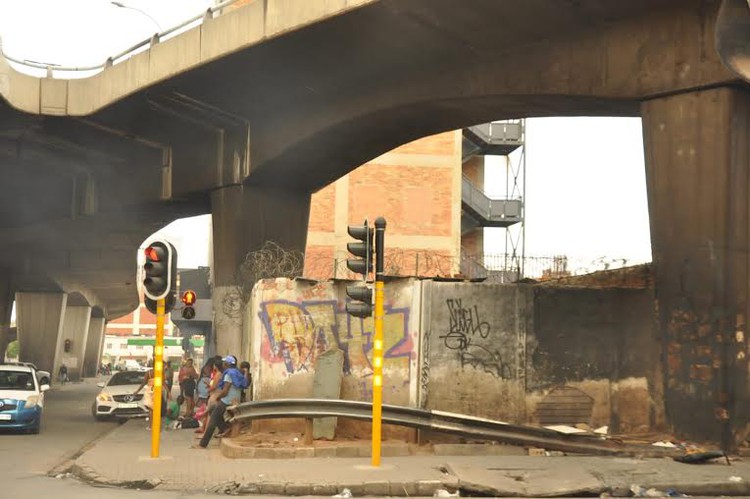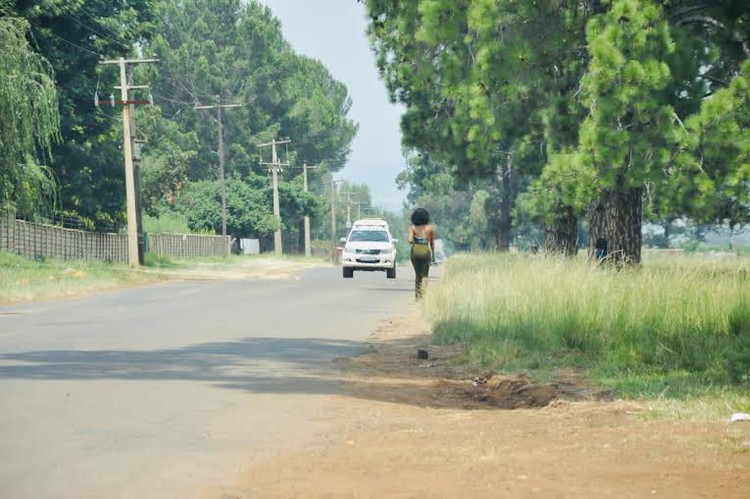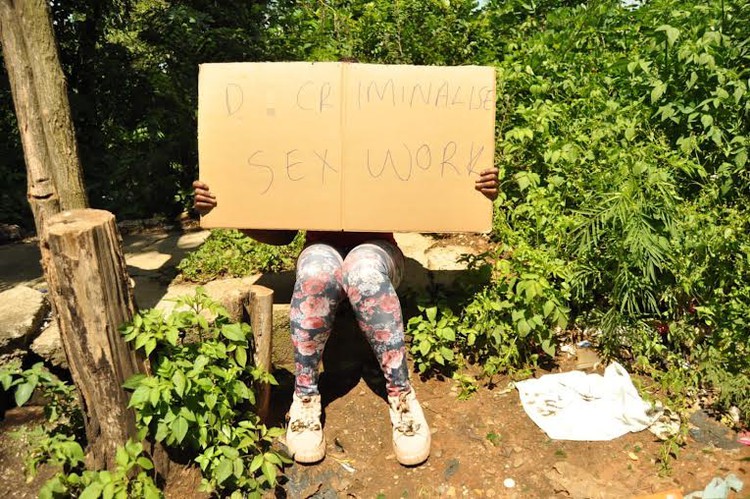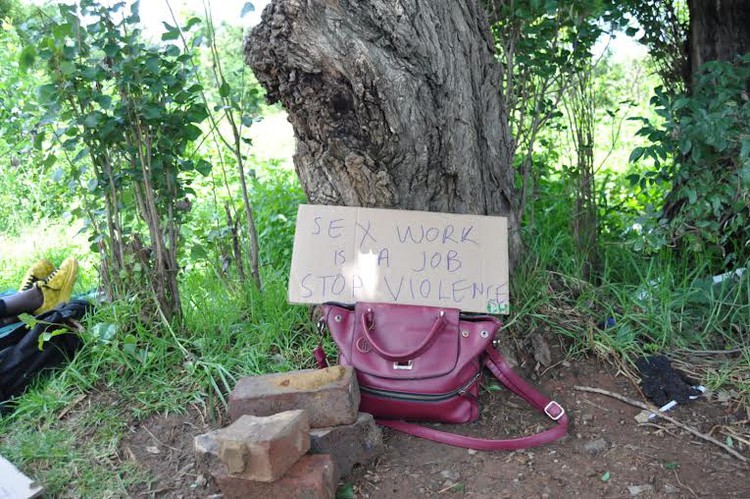A study found that 14% of sex workers surveyed had been raped by the police. Photos: Frank Ncube
Around 10 a.m. on a Monday morning in downtown Johannesburg, Thandeka* waits for customers. In the back of his mind are his two children at home in Soweto. Their school fees are unpaid and she has no money to fill their lunch box. Thandeka is a sex worker, but she hasn’t been able to work much lately, she says, because police arrest and harass sex workers day and night.
She says police regularly pepper spray women and load them into police vans to detain them at the police station. In one incident in December, police fired rubber bullets to disperse sex workers from Anderson and End streets, Thandeka said. It’s not just the arrests she complains about, but the violence that accompanies them – violence that often goes as far as rape. She says she has been raped by police more than once during her career as a sex worker.
Thandeka believes that if the police better understood the plight of sex workers, they would behave differently. “For me, I am a mother. There are a lot of things my kids need and I raised them through sex work as I haven’t been able to find another job to date. If the police put themselves in my shoes, it would reduce the stigma and the violence they inflict on us,” she says.
She hopes that the generalization of awareness training for police officers will help to alleviate the violence from which so many sex workers suffer.

At this location on the corner of Anderson and End streets in downtown Johannesburg, sex workers say they are often harassed by police.
A investigation by the SA Medical Research Council, the Wits School of Public Health and other partners, published in the International Journal of Environmental Research and Public Health in December last year, found that violence against sex workers was frequent. The survey, which interviewed 3,005 sex workers at 12 sites across South Africa’s nine provinces, found that 14% of sex workers had been raped by police.
AIDS Fund a July 2018 study of nearly 2,000 sex workers found that 39% reported violence and 31% sexual violence committed by police officers. The research was conducted by sex workers who were trained to interview their peers.
East of Johannesburg, in Vosloorus, near the Dawn Park police station, another group of sex workers also complains of violence. They say that in December the police fired rubber bullets at them to disperse them from where they were working. Police were responding to residents’ complaints that the women were “indecent” in public. Workers say a sex worker was hit in the thigh by a rubber bullet and has not returned since.
“All this shame and humiliation, because of the way we make a living,” says Nomusa*. She says the police break down the doors of an informal brothel where she works, beat and threaten them and even extort money from their customers.
“Just a few days ago they kicked the door open while I was inside with a client. They beat us. I was traumatised. They threatened to take the man back to his wife, unless he pays them.
Their location along Boundary Road has become a target for police from other clusters as it is considered a criminal area due to hijackings and drug trafficking. They say the police are ruthless when they come to chase them. They complain of being arrested and persecuted for being found with condoms in their bags.

A woman walks along Boundary Road in Dawn Park, where sex workers often work.
Dawn Park police are among those who received awareness training last year, according to Pamela Charuvinga, training coordinator for Sisonke, a sex workers’ rights organization. She says police officers attended training in Germiston in October and there was a follow-up workshop after the rubber bullet incident in December.
Dawn Park Police Station spokesman Capt. Dan Mahlangu said his police station has a good relationship with sex workers in the area. He confirmed that meetings had been held with the women to encourage them to speak to the police if they needed help. But sex workers say the issues have yet to be resolved.
“The days of detaining sex workers overnight are over, but we have to keep in mind that their trade is illegal,” Mahlangu said. “People in the neighborhood complain about being indecent, so we try to warn them from time to time. When we bring them here, we just write them down and post them. But the problem is that their area of work is a drug hub and some sex workers fall victim to thieves and clients, and we have had reports of their clients being hijacked. Police officers from other clusters also come there for raids.
Mahlangu said he had received complaints from Sisonke about rubber bullets and violence. “Our station is not responsible. We have made it clear that our door is open if they wish to report and we will take action,” he said.
“We have conducted police sensitization training in Johannesburg, Cape Town and Kwazulu Natal, mainly with police officers at senior levels,” Charuvinga said. “We will be stepping up training this year to ensure that lower-ranking officers have a better understanding of sex workers. We have seen positive results from officers who have completed the training. »
Activists from the Sex Worker Defense Task Force (SWEAT) and Sisonke say the training has helped some officers better understand the plight of sex workers. They say better relations with some police officers have led to a reduction in violence.
Megan Lessing, media advocacy manager for SWEAT, said the training had long-term goals and it was too early to assess the results. “But police awareness training is now an ongoing process.”
“We cannot escape the fact that criminalization plays a bigger role in how the police treat sex workers. But now that talks are underway with the Department of Justice to decriminalize sex work, we are optimistic things will get better,” Lessing said.
During the training sessions, Charuvinga says, sex workers take turns talking to police officers about their backgrounds and some of the reasons they engage in sex work. Sometimes they describe the different forms of abuse they have suffered at the hands of the police. Police officers are questioned at the beginning and end of the session about their attitudes towards sex workers.
“The good thing is that our evaluation forms show a change of heart among the officers we train,” Charuvinga said.
Following reports of police victimization of sex workers in an open area called Marikana in Springs, the Springs Police Station received a directive from its regional office to take action.
According to the spokesman, Captain Johannes Ramphora, a meeting took place in the Marikana area between the sex workers, representatives of Sisonke and the police. During the meeting, the police were made aware of the plight of sex workers. According to Ramphora, they now have occasional meetings with the sex workers to make sure they are safe.
Edith (name changed), a sex worker who was present at the training, said: “We were able to tell the police our problems and our facts. We now have police protection and are able to report when we are victimized, which we could not do before.

© 2022 GroundUp. This article is licensed Creative Commons Attribution-NoDerivatives 4.0 International License.
You may republish this article, provided you credit the authors and GroundUp, and do not edit the text. Please include a link to the original article.
We put a web beacon in the article so we can count traffic to republishers. All analytics tools are only on our servers. We do not give our logs to third parties. Logs are deleted after two weeks. We do not use any IP address identifying information except to count regional traffic. We are only interested in counting hits, no following users. If you repost, please do not remove the web beacon.

